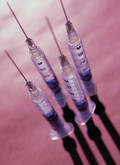Biosimilars
EMA publishes revised biosimilar Q&A document for patients
On 27 September 2012 EMA published its revised Questions and Answers (Q&A) document on biosimilar medicines aimed at patients and the general public.
Overview of research on safety and immunogenicity of biosimilars in 2012
Period: January to August 2012
Biosimilars or ‘biosimilar medicinal products’ are medicinal products that are similar (but not identical) in terms of quality, safety and efficacy to an authorised biological reference medicine. Manufacturing of biologicals is complex, and the quality of the resulting biological is dependent on careful control of manufacturing processes and conditions. Unlike traditional small molecule (chemical) drugs, the development of biologicals is different and variable with respect to the manufacturing process and environmental factors, such as light and temperature. The complexity and heterogeneity of the molecular structure, complicated manufacturing processes, different analytical methods and possibility of immunogenicity reactions make quantitative evaluation of biosimilars a challenge to both the scientific community and regulatory agencies.
EMA receives second application for biosimilar infliximab
According to EMA’s list of applications for new human medicines under evaluation by the Committee for Medicinal Products for Human Use released in September 2012, the agency will be reviewing a second application for a biosimilar version of infliximab.
Bioton and Medipolis sign insulin analogue technology licensing agreement
Polish biotechnology company Bioton and Finnish-based contract research organisation (CRO) Medipolis GMP (Medipolis) have signed a licensing agreement on the manufacturing technology of an insulin analogue.
Naming and interchangeability of biosimilars raised in new survey
The contentious issues of naming and interchangeability of biosimilars in the US have been raised once again, as a result of a survey carried out by the Alliance for Safe Biologic Medicines (ASBM). The survey, released on 13 September 2012, examined physician practices and perspectives with regard to identification and substitution of biosimilars. These remain issues that are as yet unresolved by FDA.
Roche does not see a threat from biosimilars until 2015
Switzerland-based drugmaker F. Hoffmann-La Roche (Roche) expects results from 19 late-stage clinical trials over the next 18 months to provide a stream of products to offset potential near-term threats to its cancer drugs Herceptin (trastuzumab) and Rituxan (rituximab).
Boehringer Ingelheim starts biosimilar rituximab trial
Germany-based Boehringer Ingelheim Pharmaceuticals (Boehringer Ingelheim) is starting a Phase III trial for a biosimilar version of rituximab.
Sun recalls biosimilar brain treatment
India-based Sun Pharmaceutical Industries (Sun Pharma) is once again in the news, but for the wrong reasons.
Biosimilar comparability debate continues
Authors Schellekens and Moors comment on the response from EMA’s Biosimilar Medicinal Products Working Party to questions that they raised regarding EMA’s comprehensive biosimilar regulatory pathway [1]. While the authors express their appreciation of the openness of EMA in the way it has pioneered the biosimilars pathway in Europe, they still argue that EMA has failed to show the scientific need for biosimilar comparability [2].
Teva receives FDA approval for filgrastim in the US
Teva Pharmaceutical Industries (Teva) announced on 30 August 2012 that FDA had granted approval for tbo-filgrastim (XM02 filgrastim), the first new granulocyte colony-stimulating factor (G-CSF) to be approved in the US in more than 10 years.













